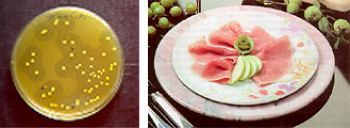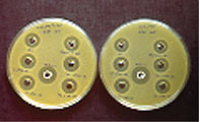NATURAL FOOD PRESERVATIVES
|
Description |
In our research group we are proceeding to the biochemical, immunological and genetic characterization of bacteriocins produced by lactic acid bacteria (LAB) of food origin. Bacteriocins are small antimicrobial peptides that inhibit the development of other microorganisms in food.

Lactic bacteria producing bacteriocins and food susceptible of biopreservation by bacteriocins.
|
How does it work |

Antimicrobial activity of bacteriocins.
Bacteriocins are microbial peptides of small size, with a very potent antimicrobial activity against zoonotic bacteria and against those responsible of foodborne diseases in man. They are resistant to heat and are hydrolyzed by gastric proteinases, which ensures their inactivation and safety of ingestion, as well as their possible use as natural food preservatives.
The purification of bacteriocins to homogeneity may permit their direct use as natural antimicrobial peptides and biopreservative agents in foods. The purified bacteriocins could also be used in the preparation of nutraceutical or functional foods.
|
Advantages |
- The use of bacteriocins as food preservatives would facilitate the substitution of synthetic chemical additives by natural ones, made by microorganisms considered safe in food.
- Because bacteriocins are resistant to heat, acidity, low water activity, etc., they can be used to increase the microbial safety and shelf life of many foods.
- Foods with purified bacteriocins improve the supply of foods considered as nutraceuticals or functional, which can improve their commercial image and competitiveness in the food industry.

Application of this technology to food.
|
Where has it been developed |
This technology has been developed in the Department of Nutrition, Bromatology and Food Technology of the Faculty of Veterinary Medicine of the University Complutense of Madrid (UCM). This department already has an experience of more than 10 years in the biochemical, immunological and genetic characterization of bacteriocins produced by lactic acid bacteria of food origin.
The bacteriocins characterized up to now are nisin A, nisin Z, pediocin PA-1, lactocin S, enterocin A, enterocin B, enterocin P, enterocin L50A and enterocin L50B, enterocin JSA and enterocin JSB, and enterocin HF.
Currently we also have genetically modified L. lactis strains (OGM's) producing nisin A, pediocin PA-1, enterocin P and enterocin A.
|
And also |
As a technology involved in the identification and characterization of natural antimicrobial peptides still under evaluation and subject to legislation regulating the use of these substances, our research group can provide sufficient experience and know-how to initiate "in vitro" studies as well as the use of techniques for scaling up and evaluation of their effectiveness in real situations, all of them aimed to evaluate the potential of bacteriocins as natural food preservatives.
|
Contact |
|
© Office for the Transfer of Research Results – UCM |
|
PDF Downloads |
|
Classification |
|
Responsible Researcher |
Pablo E. Hernández Cruza: ehernan@vet.ucm.es
Department: Nutrition, Bromatology and Food Technology
Faculty: Veterinary Medicine


